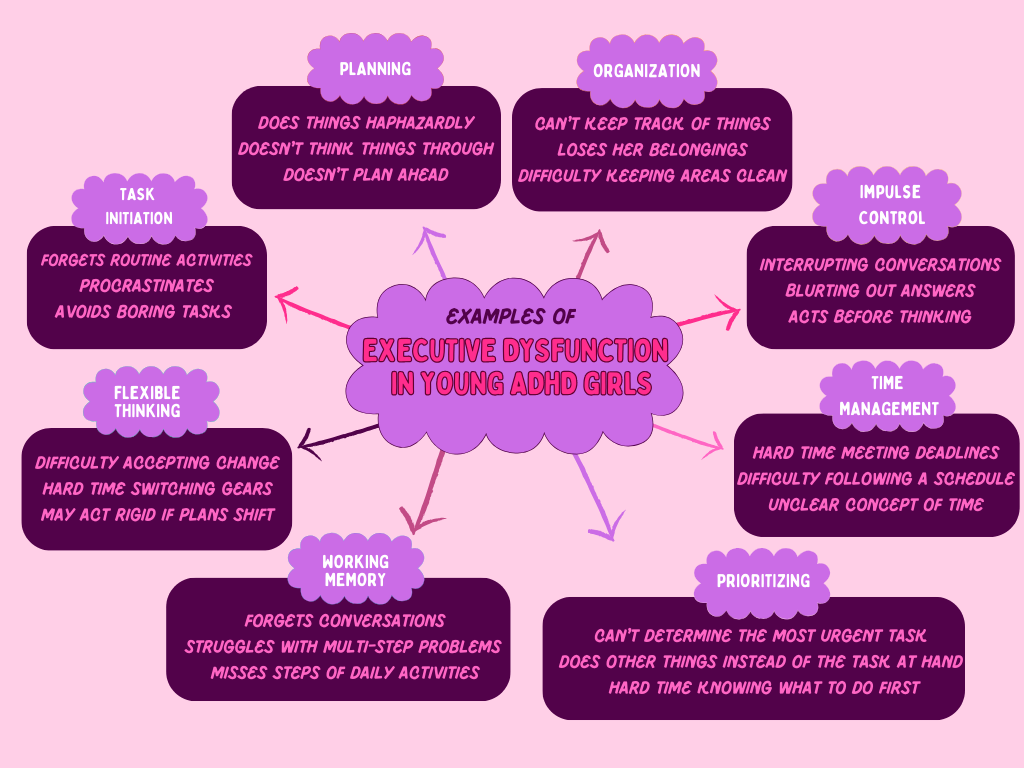
Helping Your ADHD Daughter Navigate Executive Function Challenges
What are executive function skills?
Executive function skills are essential self-regulating abilities everyone uses daily for almost everything, including organizing, prioritizing, and thinking before speaking. These skills are developed and refined during childhood. However, girls with ADHD often miss out on developing these skills and have executive function impairments or executive dysfunction.
Your daughter may have difficulty finishing tasks on time. Keeping track of her belongings is a constant struggle. Even accomplishing daily tasks requires frequent reminders. As frustrating as this may be for you, it’s even more frustrating for her. But you can help her practice and develop these skills by implementing these practices.

Simple tips for developing executive function
Use checklists
Checklists help girls with ADHD remember routines that have multiple steps. Because executive function affects working memory, even routine daily activities can be difficult when you have ADHD. Think of things you constantly remind her about, such as brushing her teeth before bed. Does she struggle to get ready for school on time? Defining the steps of a routine or task makes it easier and more achievable for a child with ADHD. Checklists can be written or in picture form. If she forgets the next step of a task, she has a ready reminder to help.
Give clear, concise directions
Executive function helps work through multi-step problems or tasks. When it’s impaired, following multiple steps is much more difficult. So, give your daughter short, simple directions. Similar to using a checklist, this will help her understand what she should do and follow through with each step. For example, you need her to pick up her clothes and take them to the laundry. You could say, “I need you to pick up your clothes and put them in the hamper.” Once that task is done, you can ask her to take the basket to the laundry room.
Make sure she’s paying attention
But before asking your ADHD daughter to do anything, get her attention. ADHD affects the ability to focus, another area of executive function. So, when you speak to her, she may seem like she’s somewhere else or “zoned out.” It can be frustrating. But remember, she isn’t trying to be disrespectful or difficult; her brain is wired differently. So first, make sure you have her full attention.
How to get her attention
The best way to get her attention is to be close to her. Shouting requests from the kitchen is like sending smoke signals in a storm. It doesn’t work. Stand in front of your daughter and make eye contact. Touch her shoulder. Or get on eye level. Once you have her attention, say: “I need you to do this now.” If she doesn’t process the request, ask, “What do you need to do right now?” If she knows, you can say: “Show me you know what you need to do.”
Structure her routine
It’s harder for girls with ADHD to be flexible and adaptable. But you can help by providing her with a daily routine and structure. She should do the same things in the same order if possible. Of course, you can add some variety occasionally to keep it interesting, but a routine will help her know what is expected of her.
Offer rewards
You can offer her small incentives or rewards for completing a task. Although some girls are responsive to praise and frequent encouragement, others are more motivated by something tangible. Do what works for your daughter. The reward should be large enough to encourage her to complete the task.
Provide frequent breaks
Executive function helps regulate emotions, and girls with ADHD are prone to getting overwhelmed. So, allow her to take frequent breaks from tasks. The same goes for when she is learning something new. Suggesting a break before she gets overwhelmed will benefit both of you. But don’t let her do something so fun she will resist getting back on task. For example, give her 5 minutes to pet the dog or stretch instead of 30 minutes of video games. However, that can be tricky. Because with ADHD, 5 minutes can seem like 5 seconds—which brings us to our next tip for developing time management skills.
Use alarms
ADHD affects the perception of time and makes it more difficult to predict how much time something will take or how much time has passed. So, let’s use the example of taking a break. Let your daughter know how much time she has, i.e., 5 or 10 minutes, and set an alarm for the agreed time. A kitchen alarm is an impartial timekeeper. For instance, if you say, “your 10 minutes is up,” your daughter may protest that she still has more time. But if you use a timer, it’s much harder for her to argue that she hasn’t had a full break. She’ll also start developing a better understanding of how time passes. Additionally, an alarm can empower her to return to work on her own. Of course, she may need a prompt even with the alarm, but learning how to manage her time now will benefit her for the rest of her life.
Teach self-advocacy skills
Here’s a tip that will help her outside of home, and it’s an essential life skill. When children have executive dysfunction, being given a lot of information at one time is overwhelming. It’s too much, and it won’t be fully processed. But more often than not, an ADHD child won’t speak up and ask for clarification. She may not know what she needs, much less how to ask for it. So, help her learn how to advocate for herself. It’s a life-changing skill.
“Teaching them some self-advocacy phrases, like ‘I need a break’ or ‘Can you repeat that?’, can make a huge difference. It’s a way of reframing it so they don’t feel bad about needing help.”
~~~Liz Angoff, Ph.D.
Summary of Executive Function Skills
These tips will help your daughter learn new executive function skills and improve on old ones. She’ll know what’s expected of her and become more successful with checklists and routines. And you’ll communicate more effectively. But remember, change doesn’t happen overnight. Keep in mind the goal is to help her succeed. Maintain a positive outlook and stay as consistent as you can. You’ll gradually see improvements that keep increasing over time.
Want to learn more? Download your free executive function skills checklist
Share via:

Pingback: ADHD Girls and Executive Dysfunction: Why It’s ‘Can’t,’ Not ‘Won’t - FINDtheADHDgirls
Pingback: ADHD Girls, Intelligence, and Executive Function: What You Need to Know - FINDtheADHDgirls